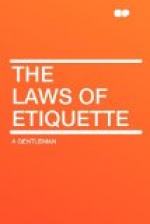A note of invitation or reply is always to be enclosed in an envelope.
Wafers are now entirely exploded. A letter of business is sealed with red wax, and marked with some common stamp. Letters to gentlemen demand red wax sealed with your arms. In notes to ladies employ coloured wax, but not perfumed.
CHAPTER VII. VISITS.
Of visits there are various sorts; visits of congratulation, visits of condolence, visits of ceremony, visits of friendship. To each belong different customs.
A visit and an insult must be always returned.
Visits of ceremony should be very short. Go at some time when business demands the employment of every moment. In visits of friendship adopt a different course.
If you call to see an acquaintance at lodgings, and cannot find any one to announce you, you knock very lightly at the door, and wait some time before entering. If you are in too great a hurry, you might find the person drawing off a night-cap.
Respectable visitors should be received and treated with the utmost courtesy. But if a tiresome fellow, after wearying all his friends, becomes weary of himself, and arrives to bestow his tediousness upon you, pull out your watch with restlessness, talk about your great occupations and the value of time. Politeness is one thing; to be made a convenience of is another.
The style of your conversation should always be in keeping with the character of the visit. You must not talk about literature in a visit of condolence, nor about political economy in a visit of ceremony.
When a lady visits you, upon her retiring, you offer her your arm, and conduct her to her carriage. If you are visiting at the same time with another lady, you should take leave at the same time, and hand her into her carriage.
After a hall, a dinner, or a concert, you visit during the week.
Pay the first visit to a friend just returned from a voyage.
Annual visits are paid to persons with whom you have a cool acquaintance, They visit you in the autumn, you return a card in the spring.
In paying a visit under ordinary circumstances, you leave a single card. If there be residing in the family, a married daughter, an unmarried sister, a transient guest, or any person in a distinct situation from the mistress of the house, you leave two cards, one for each party. If you are acquainted with only one member of a family, as the husband, or the wife, and you wish to indicate that your visit is to both, you leave two cards. Ladies have a fashion of pinching down one corner of a card to denote that the visit is to only one of two parties in a house, and two corners, or one side of the card, when the visit is to both; but this is a transient mode, and of dubious respectability.
If, in paying a morning visit, you are not recognized when you enter, mention your name immediately. If you call to visit one member, and you find others only in the parlour, introduce yourself to them. Much awkwardness may occur through defect of attention to this point.




